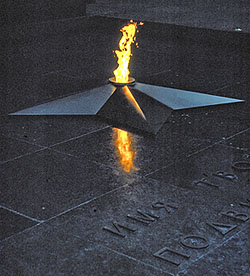![]()
What you must do in this unit
- Read the section "Supremacist Nationalism in Italy, Germany and Japan" in chapter 28 in the textbook.
- Read my remarks on Russia and World War II and my short notes on the Second World War.
- Watch the short video on World War II by Professor Evans.
- Professor Campbell has two relevant videos for this unit: Is Fascism B.S.? and Is Modern Antisemitism B.S.?
- Read the Atlantic Charter (1941) as the basic statement of the desire to create a fair peace to end the war and to ensure basic freedoms for all people.
- Study the Questions to Consider and the Key Terms for the unit.
- Submit the required Genocide group project and peer evaluations (100 points).
What you can do in this unit
- Have a look at the online presentation on the Holocaust in Poland (collaboration between myself and Professor Andrew Wise).
- Read the short paper by Bryan Grasser on Bletchley Park, Great Britain's secret code-breaking operation during World War II (PDF).
- Have a look at the narrated online Prezi, created by Claire Foote (former student), on the Japanese Internment Camps in the United States.
- Read some of the great, inspirational speeches by Winston Churchill: We Shall Fight on the Beaches (Speech to the House of Commons, June 4, 1940) and Blood, Toil, Tears and Sweat (May 13, 1940).
- The Source List and Detailed Death Tolls for the Man-made Megadeaths of the Twentieth Century by Matthew White is an extremely interesting site that deals not just with the major wars but also famines, etc.
- Christine Brooks, former student, Rise of Militarism in Japan (timeline made with Tiki-toki) is excellent.
- Miyoko Spratley (fall 2017) created this story map on Japanese War Relocation Camps 1942-1946.
Some videos that you can watch for this unit
- World War II: Crash Course World History #38
- Charlie Chaplin as the Great Dictator (his speech in the last four minutes)--the movie is a satire of Hitler's Germany.
- (Here is a pretty good video, The Fallen of World War II, that examines the heavy casualties of the war and their possible postwar impact.)
- Adolf Hitler (history.com)
- Adolf Hitler (biography)
- Italy under Fascism
- Benito Mussolini (biography)
- Mussolini Executed! 1945/04/30
- Why We Remember the Holocaust
- World War II: The Lost Color Archives (1/5)
- German Surrender (US newsreel footage)
- 20th Century Battlefields: Stalingrad Part 1/6
- German Invasion of Russia (World War II)
- The Russian German War - Episode 102: Darkness Descends
- (2/12) Battlefield I The Battle for Russia Episode 10 (GDH)
- For extra credit please suggest to your instructor a relevant video for this unit of the course. Send the title of the video, the URL and a brief explanation of why you find the video interesting and applicable to the material that is being studied in this unit.
Extra Credit Options
- For up to 50 points of extra credit, submit a two-page paper comparing the experiences of colonial soldiers from West Africa in the French army with those of African-American soldiers in the US army.
- For up to 25 points of extra credit, read Neville Chamberlain's Peace For Our Time speech (30 September, 1938; transcription) and then his comments on the agreement in the House of Commons and write a one-page paper examining Chamberlain's intent and rationale for the Munich agreements.
- For up to 25 points of extra credit, read the Documents on the Decision to Drop the Bomb and write a one-page paper summarizing some of the pros and cons of the decision to use the atomic bomb in 1945.
- For up to 10 points of extra credit, read A. Anatolii [Kuznetsov], Babi Yar (1967, published in Moscow by Molodaia Gvardiia) and write a long paragraph explaining why that horror occurred.
- For up to 10 points of extra credit, read Vyacheslav Molotov (1889-1986) broadcast on the Invasion of The Soviet Union (June 22, 1941) and write a paragraph explaining the key points of Molotov's speech. Note that it was Molotov, not Stalin, who announced that the Soviet Union was now at war with Germany.
- For up to 10 points of extra credit, read Adolf Hitler Reichstag Speech, (February 20, 1938) and in a paragraph explain your interpretation of Hitler's remarks.
- For up to 5 points of extra credit, watch Leni Riefenstahl's documentary film Triumph des Willens (Triumph of the Will) and answer the movie study questions. Please write in formal, complete sentences.
- For extra credit please suggest to your instructor a relevant video for this unit of the course. Send the title of the video, the URL and a brief explanation of why you find the video interesting and applicable to the material that is being studied in this unit.
Extra Credit Options
- Upon successful completion of this unit, you will be able to (1) demonstrate knowledge of the scope and cost of World War II, (2) explain the human cost of the war and (3) analyze historical primary sources.
